Pascal Cleatus Poolaw, SrFirst SergeantCO C, 1ST BN, 26TH INF RGT, 1 INF DIV Army of the United States 29 January 1922 - 07 November 1967 Apache, Oklahoma Panel 29E Line 043 |
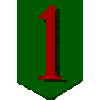
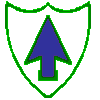
| |
 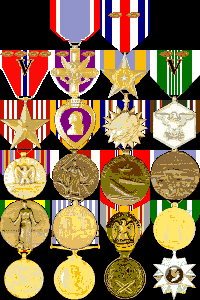
|
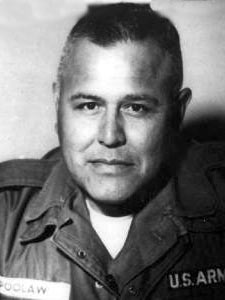
|
The database page for Pascal Cleatus Poolaw, Sr
|
First Sergeant Pascal C. Poolaw was a hero in three wars, WW2, Korea, and Vietnam. He was a full blooded Kiowa Indian who enlisted in the Army during WW2 and was awarded the Silver Star and Purple Heart fighting the German Army. During the Korean War, Pascal was wounded again and awarded the Distinguished Service Cross and a second Purple Heart. Although he retired in 1962, he decided to reenter the Army in an effort to keep his four sons, who were all in military service, from having to go to Vietnam. 1SG Poolaw was killed attempting to rescue his Battalion Commander and his staff from an overwhelming enemy assault. As 1SG Poolaw was carrying a wounded soldier to safety, he was struck by a rocket propelled grenade and killed. For his heroic actions 1SG Poolaw was awarded his second Silver Star and third Purple Heart posthumously. 1SG Poolaw was my unit First Sergeant during 1958-59 while I was assigned to the 7th Infantry Division in Korea. 1SG Poolaw has been honored many times since his death in Vietnam. He is the most decorated Kiowa Indian ever to have served in the U. S. Military. A more dedicated soldier could never have been found than 1SG Poolaw. This nation owes this genuine hero a great debt of gratitude for his service and ultimate sacrifice of his life as he fought for and died attempting to save fellow servicemen. First Sergeant Poolaw will always be my hero.
From a soldier in his unit in Korea, 01 Jun 2006 As we celebrate another Memorial Day, I just want to tell a great soldier, American and friend that you are not forgotten here on earth. You reached the apex as a great leader and sacrificed your life while saving fellow members of your unit in Vietnam. I have spoken with many members of your family and fellow soldiers who have great memories of your wonderful life you shared with us all. I trust you are looking down on us with that familiar smile on your face. Thanks very much for being a friend and military leader to so many grateful soldiers who were honored to serve with you "FIRST SERGEANT".
From a friend and former member of his unit, |
|
On April 2nd 2004 Aubree Jo Ann Poolaw was born. She is the most perfect little girl. I just want to say thanks to you and your family.
From |
|
Shortly after 1SG Poolaw was assigned to the company I began to understand what it meant to be the First Sergeant. He appeared to never sleep, constantly checking the line, giving words of encouragement, and putting a boot in the butt when he knew it was needed. I rotated back to the states in October, and of all the soldiers I came in contact with over the years his is the one name I never forget. When I was selected for Sergeant Major I paid a visit to the Wall, and left my First Sergeant Chevrons at the base of the panel bearing his name. It was his teachings that helped me grow from a gangly boy of 19 to a man. I will always honor his memory.
Norris W. Ridgeway |
|
I joined Charley Company in mid-October, 1967 having been transferred up from Alpha, 2/28th. 1st Sgt Poolaw and Captain Len Tavernetti assigned me to the November platoon (3rd platoon). 1st Sgt Poolaw and Robert Stryker were like two cats going after each other off and on. Stryker had the ability to make Poolaw mad and Poolaw would threaten to catch him and tar and feather him. It was so funny to watch ... as long as we all stayed out of their little battles. 1st Sgt Poolaw was a master psychologist whether he would admit to it or not. He knew how to motivate his men. He was able to maximize effort with his orders to insure that the job not only got done but got done correctly. There were many a teary eyed grunt as we carried his body over to the LZ. Some of the men who knew him well were very upset. We had lost not only a good leader but an inspirational one as well. Every once in awhile, we would catch him smiling as he talked about his Charlie Company men. On November 6th, we landed in a LZ on top of a big hill. We all joked it was a 'hot LZ' and it was ... not because of incoming fire but the fact that the gunships had come in shooting on the first lift and set the elephant grass on fire! It was probably 90+ degrees as well. 1st Sgt Poolaw was directing the incoming supply loads in addition to assisting the set up for our Dobol bunkers with interlocking fire slots. He made sure we got extra engineer stakes for the command group so their bunker would have sufficient overhead cover in case of mortar fire. You see, he had a hunch this was a bad 'A.O.' (Area of Operation). With a twinkle in his eyes, he told us on the detail that day "Good job, men. You've worked hard." Like an 1850's Cavalry soldier, he died with his boots on. Like a Native American, he went down with honor trying to help his fellow soldiers. May he and Stryker continue their personal verbal bouts up in the heavens!
From a friend, |
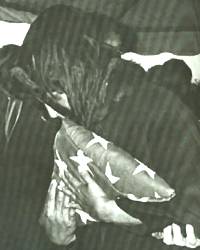
At the interment of First Sergeant Pascal C. Poolaw, much-decorated Kiowa killed in Vietnam, his widow, Irene, kisses the flag that draped his casket. Photograph by Bill Dixon, Lawton (OK) Constitution. Courtesy of the Fort Tours site and the Lawton (OK) Constitution
|
Notes from The Virtual WallThe Battle of Loc Ninh began on 29 October 1967 when the 272nd and 273rd Viet Cong Regiments converged on Loc Ninh, the 272nd from the northeast and the 273rd from the west. At 0100 hours on 29 October the 273rd Regiment attacked the district headquarters and the Civilian Irregular Defense Group (CIDG) and Special Forces camp at the Loc Ninh airfield. The 273rd Regiment pressed the attack until 0535 when it was forced to withdraw. Although it had briefly penetrated the CIDG compound, there were 147 Viet Cong bodies on the battlefield.In reaction to the attack, Major General John H. Hay, Jr., commander of the 1st Infantry Division, deployed four battalions and their supporting artillery in a rough square around Loc Ninh. At 0630 on 29 October the 1/18th Infantry made an air assault into the southwestern corner of the square, four kilometers west of the Loc Ninh airstrip. Elements of 2/28th Infantry, and two batteries of artillery were moved to the airstrip. 1/26th Infantry and 1/28th Infantry were moved to Quan Loi, from where they could be committed as the situation developed. Seven major engagements were fought during the following week, with heavy losses inflicted on both VC regiments. The final engagement occurred on 7 November, when two companies of 1/26th Infantry engaged the 3rd Battalion of the 272nd Viet Cong Regiment. On 6 November 1/26 air-assaulted into an area roughly eight kilometers northeast of Loc Ninh. The day after the air assault, Companies C and D and Colonel Stigall's command group engaged the 3/272nd Regiment. Artillery, armed helicopters, and air strikes supported the U. S. troops. Although fifteen U. S. troops died in heavy fighting, ninety-three enemy soldiers were killed - and the battle of Loc Ninh ended with the remnants of the two VC regiments withdrawing into the mountains. One Medal of Honor, two Distinguished Service Crosses, and at least two Silver Stars were earned that day. The fifteen men who died in the fighting are
First Sergeant Poolaw's legacy of service continues, in a sense; not only did his four sons serve in uniform during the Vietnam era, his grandson Donald R. Poolaw has spent the past 14 years wearing the uniform of a United States Marine and recently returned from service in Iraq.
|
|
Top of Page
www.VirtualWall.org Back to |
With all respect
Jim Schueckler, former CW2, US Army
Ken Davis, Commander, United States Navy (Ret)
Memorial first published on 26 Oct 2003
Last updated 08/10/2009